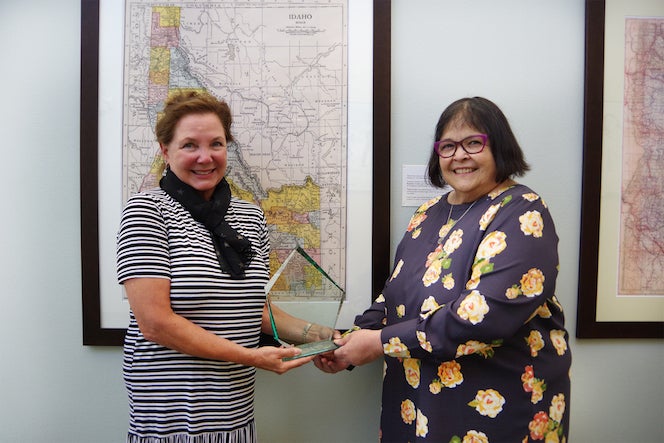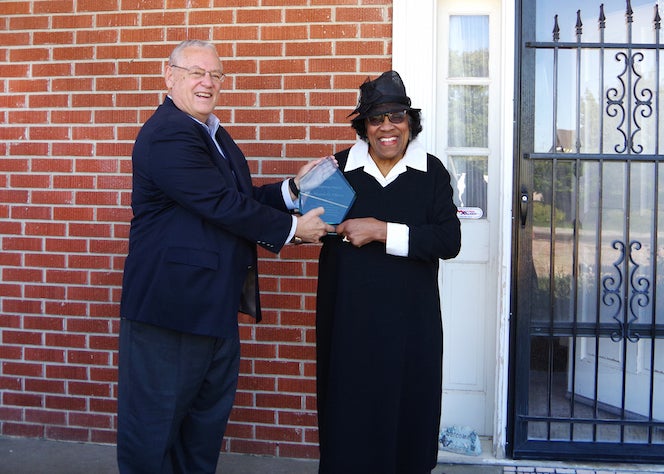
Alicia Garza and Mamie Oliver have received 2020 Esto Perpetua Awards from the Idaho State Historical Society. Garza is a professor of Spanish in the Department of World Languages. Oliver was a professor of social work, sociology and education at Boise State from 1972 to 1988. She was the university’s first tenured Black professor.
The award – the state’s highest for history – honors those who have made significant contributions to the preservation of Idaho history through professional accomplishments, public service, volunteerism or philanthropy.
The awards ceremony will take place at 5:30 p.m. Thursday, Aug. 20.
“This is a tremendous honor, gigantic and unexpected,” said Garza.
Garza acknowledged 2019 award recipient Ana Maria Schachtell and her work to preserve Mexican corridos, or ballads, for “setting a high bar.”
“I think of my students and the work of great Idaho Latinx artists like Alma Gomez and Bobby Gaytan (faculty and alumnus, respectively), and the exhibition We Carry Inside Ourselves in the Boise State Student Union last fall. All of this inspires me to keep learning and studying. That’s what I love about being at Boise State,” said Garza, “being in good company.”
Garza received her master’s degree and doctorate in Hispanic American literature at the University of Arizona. She’s been at Boise State for 24 years where she founded Casita Nepantla, a space devoted to LatinX life and culture, in the Student Union Building. Her research and teaching centers on Chicana feminist theory, popular culture, gender and sexuality, and the body in Chicana literature. In 2003, she was the recipient of the the Carnegie Idaho Professor of the Year Award. Garza is special advisor to Boise State President Marlene Tromp.
Alice Whitney, president of the Hispanic Business Association, nominated Garza for the award. Whitney wrote, “Dr. Garza has spent her life giving back to her community whether it is teaching non-Hispanic students to think and understand the differences in languages and culture, she provides the story of the Hispanic community, whether it is about the Mexican Revolution, Braceros, Cesar Chavez and his movement for equality and justice (sounds pretty familiar now), or Selena, Jennifer Lopez, Mark Anthony and countless others before them have experienced the same issues as most in our community. What comes from this new knowledge is understanding and appreciation of not only Hispanics but vice versa.”
Mamie Oliver, a native of Mississippi, received her master’s degree in social work from Los Angeles State University and her doctorate in education from Washington State University. Her research areas include the history and accomplishments of Black Idahoans. Oliver has written several books, including “Blacks in Idaho’s White Press” and “Idaho Ebony: The Afro-American Presence in Idaho State History.”
After Boise State, Oliver taught at Boston University, Rhode Island College and Northwest Nazarene University. Oliver has worked as a therapist and now is a pastor at Mountain View Community Fellowship in Boise.
Wrote Evelyn Self, who submitted Oliver’s name for the award, “Dr. Oliver is not one to be boxed in, her interests are diverse and she has touched the lives of so many.”
Oliver has chaired the Martin Luther King Jr. Task Force and the Council for Families and Children. Her interests include music and historic preservation. Oliver led the effort to list St. Paul’s Baptist Church, where her husband was a pastor, in the National Register of Historic Places. The building is now the Idaho Black History Museum in Julia Davis Park.
“I have always tried to be a good citizen,” said Oliver. “I am grateful that people feel my contributions have warranted this recognition.”
